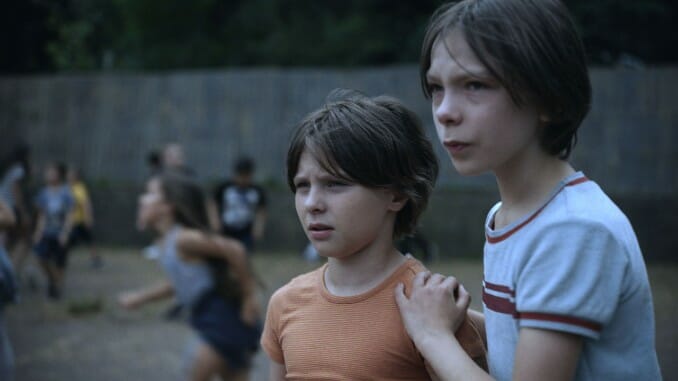This review was originally published as part of Paste’s London Film Festival 2021 coverage
There’s a moment when you go from just watching a movie to becoming fully ensnared by it. Sometimes that moment never comes, and you spend the whole runtime at a slight but significant remove. Sometimes it arrives partway through, with the onset of an unexpected revelation, or the introduction of a new character. And sometimes—rarely—it occurs within seconds. The film has barely started, and you’re immediately in its grasp.
That’s what happens in Playground, the intense debut feature from Belgian writer/director Laura Wandel. We open straight on a close-up of the weeping face of a young girl, who’s clinging on to her older brother for dear life. She is Nora (Maya Vanderbeque), and it’s her first day of school; Abel (Günter Duret) is a few years ahead. She’s eventually prised off of him, and continues her terrified trip towards those imposing doors while clutching tight onto the hand of her dad (Karim Leklou), until an offscreen voice tells them that parents can’t enter the school with their children. So Nora’s dad crouches down, gives her a hug—he looks just a little less distraught than she does—and sends her off. After one last run back to him for a final embrace, she’s as ready as she’s ever going to be.
Wandel makes a host of great decisions throughout the course of Playground, but by far the most effective is to shoot the whole film from Nora’s height. We are placed at her side in a visceral, destabilizing way; although many of the people who watch this movie won’t be able to remember their very first day at school, Wandel plunges us into the utter terror of being ripped from the comfort of home and thrust into a huge building full of strangers who are all taller than us—and a lot louder too. Wandel heightens the discomfort further by shooting in shallow focus, making the other kids into intimidatingly fast and noisy blurs. And for the entire duration, we never venture further from the building than the school gates. Playground’s original French title was Un Monde—literally “A World”—and it does often seem like Nora and Abel’s school is a universe unto itself.
After her panicked arrival, Nora eventually starts to settle into that new world: We smash cut from the frightened hunch of her shoulders as she’s about to jump into the pool to her giggling during a snowball fight. As her brother promised she would, she has made friends. For Abel, however, it’s a different story. He’s being bullied, and viciously; at one point Nora sees his classmates apparently trying to drown him in a toilet bowl. He begs her not to tell anyone, but she can’t keep secrets from her dad, and soon the bullies are hauled into a meeting with Nora’s family and the principal. After soliciting flimsy apologies, he seems to be satisfied: “I’m sure the four of you are able to get along now, right?” The naiveté of grown-ups. Wandel’s camera is trained on Nora’s increasingly agonized face throughout the whole meeting; she knows it’s going to get worse. And it does.
While the grown-ups aren’t all as useless as the school principal, they also aren’t particularly useful; it doesn’t help that the number of staff overseeing the playground—the center of Abel’s nightmare—is so clearly insufficient. Maintaining the frame at Nora’s height means that the adults are largely kept offscreen, or just visible as a pair of talking legs (not dissimilar to their presentation in the Peanuts universe). Unless they deign to lower themselves to child level—like her dad and her favorite teacher (Laura Verlinden)—they are quite literally out of the picture. However well-intentioned the adults may be, in the world of Playground, it’s up to the kids to solve their own problems.
Nora starts the movie as a burden to Abel, but as the year progresses, it’s Abel who becomes Nora’s burden. His bullying grows so widespread, his toxic reputation starts to impinge upon her own delicate social status. Having tried all she can to help him, only worsening his suffering by telling adults, the situation appears hopeless to her. Her frustration at her powerlessness becomes frustration at her brother. It’s difficult to think of a more searing recent cinematic depiction of that old truism, “hurt people hurt people” than the one Wandel presents us with. The kids in Playground lob their misery between them like a hot potato; although we don’t learn anything about the backstories of Abel’s original tormentors, you can bet that they had tormentors of their own. The very definition of a vicious circle.
Many years removed from the manifold horrors, it’s easy to minimize or resort to cliché when we talk about school days. Memories dull with time, and so does pain, but Playground brings it all flying back into sharp, sharp focus. Wandel’s movie is immersive and bruising, full of empathy for its young characters, and unrelenting in its depiction of the challenges they face. And it makes you wonder, with utmost sincerity—how did any of us ever reach adulthood in one piece?
Director: Laura Wandel
Writer: Laura Wandel
Stars: Maya Vanderbeque, Günter Duret, Karim Leklou, Laura Verlinden
Release Date: October 12, 2021 (London Film Festival)
Chloe Walker is a writer based in the UK. You can read her work at Culturefly, the BFI, Podcast Review, and Paste.
